Donald Trump to try to steady campaign with economic speech
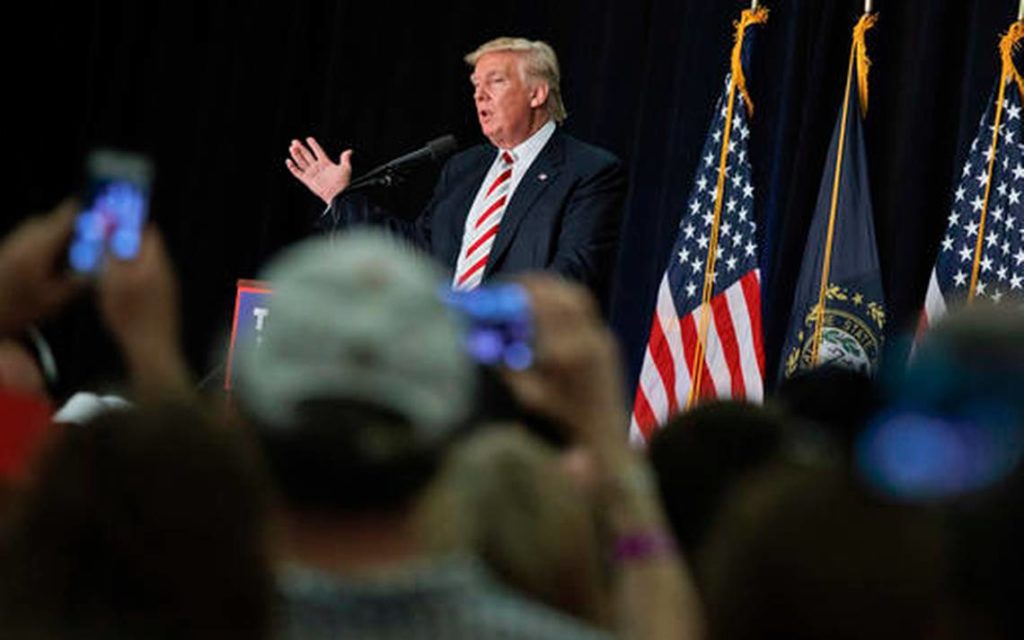
Donald Trump is trying to shift from a disastrous stretch of his presidential campaign to one focused on policy and party unity. But even as his allies speak of lessons the political newcomer has learned, two of his staunchest Republican critics warn that he could be heading for losses in a pair of battleground states. Trump is set to deliver an economic speech on Monday to the prestigious Detroit Economic Club in his effort to step past his spats over the past 10 days with the Muslim-American parents of a slain Army captain and the leaders of a Republican Party he has promised to unite. “Mr. Trump on Monday will lay out a vision that’s a growth economic plan” that will focus on cutting taxes, cutting regulation, energy development and boosting middle-class wages, campaign chairman Paul Manafort said in remarks broadcast Sunday on Fox Business. “When we do that, we’re comfortable that we can get the agenda and the narrative of the campaign back on where it belongs, which is comparing the tepid economy under Obama and Clinton, versus the kind of growth economy that Mr. Trump wants to build.” What came before Monday’s speech, Manafort suggested, doesn’t count in the race to Election Day on Nov. 8. “It’s a three-month campaign,” he said. Trump may have done irreversible damage in two critical states, Arizona and Ohio, with an approach to immigration reform that some say is divisive, two fellow Republicans say. Trump wants to build a wall between the United States and Mexico and now says he wants to suspend immigration from “terror countries” — though he has yet to say what those are. Ohio Gov. John Kasich, who lost the Republican nomination to Trump, has not endorsed the billionaire and skipped the party’s convention in Cleveland, said Trump faces a difficult climb in a state that’s a must-win for Republican presidential candidates. “He’s going to win parts of Ohio, where people are really hurting. There will be sections he will win because people are angry, frustrated and haven’t heard any answers,” Kasich said on CNN’s “State of the Union.” ”But I still think it’s difficult if you are dividing, to be able to win in Ohio. I think it’s really, really difficult.” In an interview on CBS’s “Face the Nation,” Sen. Jeff Flake, R-Ariz., said, “Yes, it is possible” that Democrat Hillary Clinton could beat Trump in his state, noting that Bill Clinton won Arizona in 1996 and that Hispanics represent about a third of the Arizona population. “You can’t just throw platitudes out there about a wall or about Mexico paying for it and then be taken seriously here,” Flake said. Clinton is expected to deliver her own economic plan to the Detroit Economic Club on Thursday. That’s who Republicans want to see Trump fighting — the former senator and secretary of state, not Republicans and others. It’s a message furious senior members of the party carried to Trump privately and publicly in the days after Trump last week refused in a Washington Post interview to endorse the re-election bids of House Speaker Paul Ryan, Sen. John McCain of Arizona and Sen. Kelly Ayotte of New Hampshire. The trio had strongly disapproved of Trump’s fight with Khizr and Ghazala Khan, Muslim-Americans whose son, Capt. Humayun Khan, was killed in Iraq in 2004. On Friday at a Wisconsin rally not attended by Ryan or Gov. Scott Walker, Trump reversed course and endorsed all three lawmakers, saying, “We have to unite.” “If you look at the last few days, I think he’s gotten the messages,” former House Speaker Newt Gingrich said on “Fox News Sunday.” ”It’s very tricky if you’ve never run for public office, to jump from being a businessman to being one of the two leaders fighting for the presidency, and he’s made some mistakes.” Former New York City Mayor Rudy Giuliani said on ABC’s “This Week” that Trump’s endorsements show he “has the ability and the understanding to realize that there are going to be disagreements and you’ve got to be able to reach out to the entire party.” Republished with permission of the Associated Press.
Liar. Lucifer. Lock her up. GOP denounces Hillary Clinton
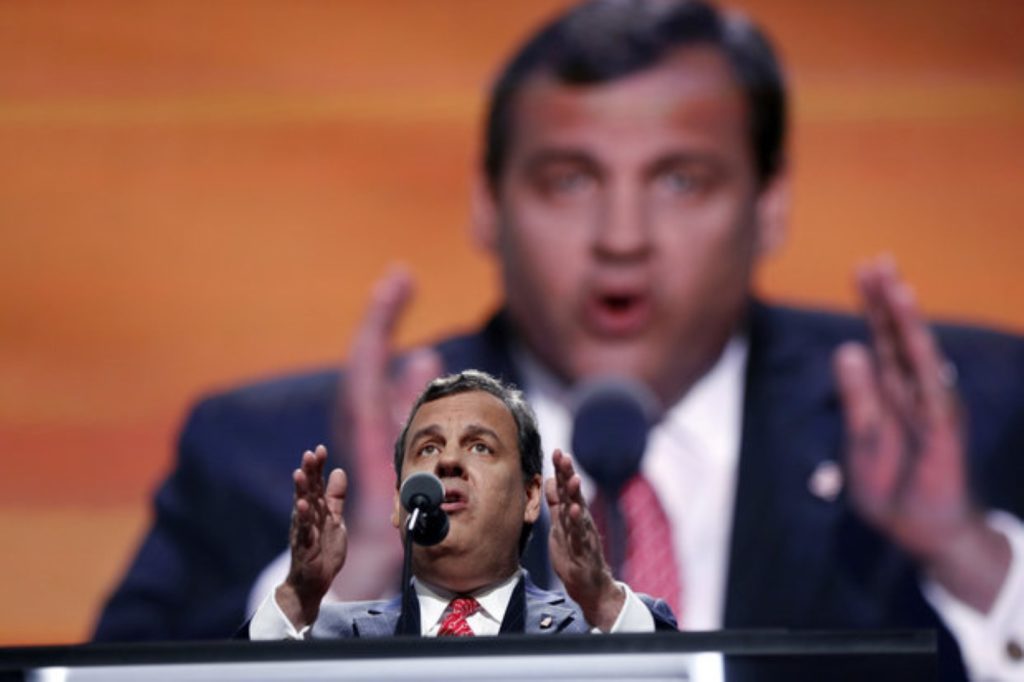
Liar. Lucifer. Lock her up. Republicans may have mixed feelings about nominating Donald Trump for president, but one thing they can all rally around is a deep dislike for Democrat Hillary Clinton. Convention speakers have “prosecuted” Clinton at a mock trial, accused her of being a serial liar and even linked her to the Devil himself. Throughout the campaign, Trump has reveled in referring to his opponent as “Crooked Hillary.” The attacks are an echo of the 1990s when conservatives denounced President Bill Clinton as the chief executive dealt with scandal and impeachment. The most blistering assault at the GOP convention came Tuesday night when New Jersey Gov. Chris Christie took on the role of prosecutor and put Clinton on trial “for her performance and her character.” The audience responded with chants of “Lock her up! Lock her up!” But others have piled on. Senate Majority Leader Mitch McConnell told the crowd scandal follows Clinton and former President Bill Clinton “like flies.” “She lied about her emails. She lied about her server. She lied about Benghazi. She even lied about sniper fire. Why, even she lied about why her parents named her Hillary,” McConnell said. And Wednesday, Trump campaign manager Paul Manafort said the airport meeting between former President Bill Clinton and Attorney General Loretta Lynch last month probably helped Clinton’s wife escape criminal charges over her use of a private email server. He told ABC that Lynch “probably” gave Bill Clinton special information that helped his wife. Manafort even tried to blame Clinton for the controversy over Melania Trump lifting passages of her convention remarks from a speech that Michelle Obama delivered in 2008. “For people to try and disparage that speech and say that it was something that it wasn’t is once again politics,” he told Fox News. “It’s Hillary Clinton once again feeling threatened by a woman and trying to destroy the woman and demean her as a way of positioning her own fate.” Perhaps the wildest attack on Tuesday came from former GOP presidential candidate Ben Carson, who told the crowd that one of Clinton’s “role models” — community activist Saul Alinsky — “acknowledges Lucifer” in a 1971 book. “So are we willing to elect someone as president who has as their role model somebody who acknowledges Lucifer?” Carson said. “Think about that.” Clinton wrote a college thesis about Alinsky and has said she agreed with some of his opinions on social change, but disagreed with his view that the system could only be changed from the outside. Some Republicans are wary of going too far. Arizona Sen. Jeff Flake, one of the more prominent Trump skeptics, Tweeted late Tuesday: “@HillaryClinton now belongs in prison? C’mon. We can make the case that she shouldn’t be elected without jumping the shark.” But attacking Clinton may be the most effective tactic with polls showing high unfavorable ratings for both candidates. An Associated Press-GfK poll this month found that three-quarters of voters say their pick for president is motivated by a desire to cast their ballot against Clinton or Trump. Republished with permission of the Associated Press.
Large number of GOP senators skipping Donald Trump’s convention
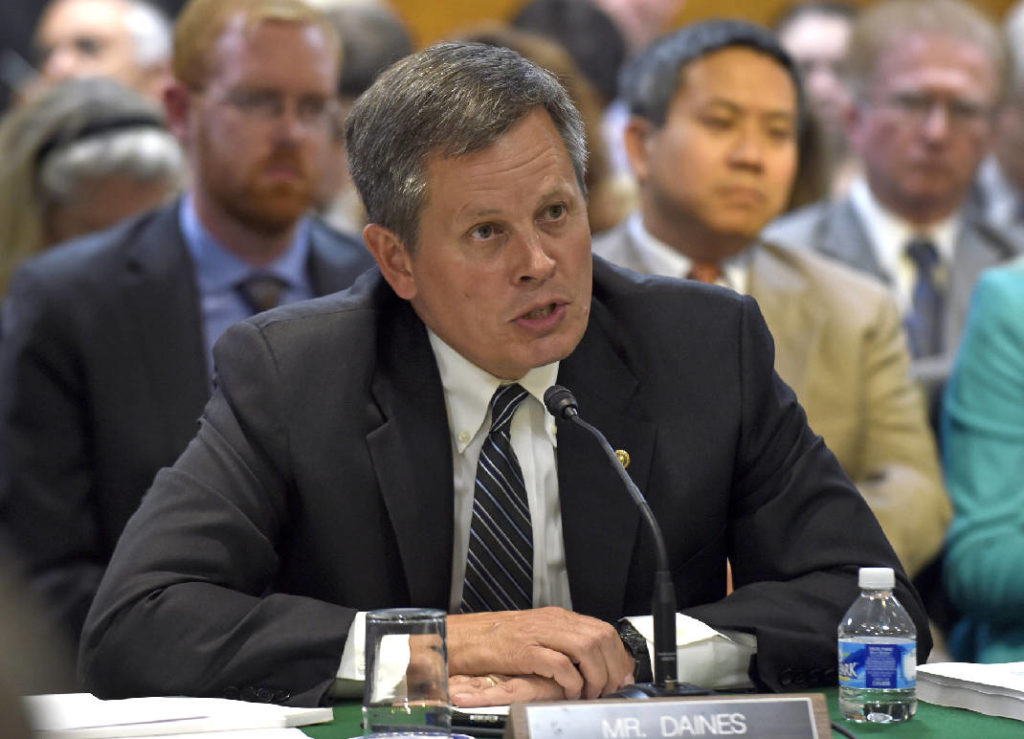
Sen. Steve Daines of Montana will be fly-fishing with his wife. Sen. Jeff Flake of Arizona said he has to mow his lawn (yes, he has one even in Arizona). Sen. Lisa Murkowski of Alaska will be traveling her state by bush plane. And Sen. John McCain of Arizona will be visiting the Grand Canyon, and joked that his friend Sen. Lindsey Graham of South Carolina would be coming along and might even fall in (just kidding, an aide later clarified). All are among the GOP senators who will be skipping next week’s convention in Cleveland where Donald Trump will claim the Republican Party presidential nomination. A majority of Republican senators do plan to attend, and it’s not unusual for lawmakers to skip their party’s convention, especially if they’re up for re-election and need to spend time campaigning. But the level of rank-and-file congressional defections from this year’s Republican convention is unusually high. Perhaps that’s unsurprising, given the GOP establishment’s well-documented discomfort with the man who stands on the cusp of becoming their presidential standard-bearer. But in the halls of the Capitol this week, some senators seemed to visibly squirm when asked about their convention plans. Sen. John Thune of South Dakota, a member of the party leadership, gave a lengthy series of responses to questions earlier this week that ultimately left his plans unclear. “I think it’s going to be a different and unique convention experience. You know I’ve been to a number of them in the past, and this year is different, and we’ll see how it goes,” Thune said. “For most people they go because it’s the Republican convention, and it’s our party’s effort in a presidential election year to talk about what we’re for and what we’re about. So that will go on.” The next day, Thune said he was still “firming up” his plans. Confronted for months with uncomfortable questions about Trump, some senators can still seem aggrieved to get asked about the presumptive nominee, and uncomfortable giving an answer. But at this late date, just days from when the convention will start on Monday, nearly all have at least decided whether or not they’re going to Cleveland. Nearly all, but not quite all. “I’m not sure yet,” Idaho Sen. Jim Risch said Wednesday, adding there are “other things going on and I’ve got to weigh where I can do the most good.” Of the Senate also-rans in the White House chase, only Sen. Ted Cruz of Texas will attend the convention and deliver a speech. Sens. Marco Rubio of Florida, Rand Paul of Kentucky and Graham are skipping the event. For the nearly two dozen GOP senators up for re-election this year, the considerations are particularly sensitive, and that’s especially true for the handful of vulnerable Republican senators in swing states. They must weigh sharing a convention hall with a nominee whose comments have offended women, minorities and others who can decide general elections. There are also concerns that given the “Never Trump” sentiments still nursed by some delegates, the convention could go off the rails and turn into a chaotic spectacle. But few senators were interested in wading into such considerations on the record. “No,” Sen. Roy Blunt of Missouri said tersely when asked if he was staying away from the convention out of a desire to distance himself from Trump. Murkowski said she had only a month to visit the remotest areas of Alaska by plane before her Aug. 16 primary. “For me, this was an easy choice” and “nothing to do” with Trump, Murkowski said. Sen. Ron Johnson of Wisconsin, one of the most vulnerable members, said he could not go to Cleveland because “I’ve got to spend as much time in Wisconsin as possible.” As for his views on Trump, Johnson said: “I support all of the areas of agreement … I’m supporting him. Let’s put it this way, I will not vote for Hillary Clinton.” Even Sen. Rob Portman of Ohio, a vulnerable senator whose state is playing host to the convention, said he will only be dropping into the convention hall from time to time, but not delivering a speech or staying to watch speeches from others. Instead, he’ll be spending his time on his own campaign events in and around Cleveland, including building a Habitat for Humanity home and holding a kayaking charity fundraiser, “Paddling with Patriots on the Cuyahoga River.” “I’m not going to have much time to listen to ’em because I’ll be out and about,” Portman said of the convention speakers. ___ Republished with permission of the Associated Press.
Republicans beginning to make peace with Donald Trump as nominee
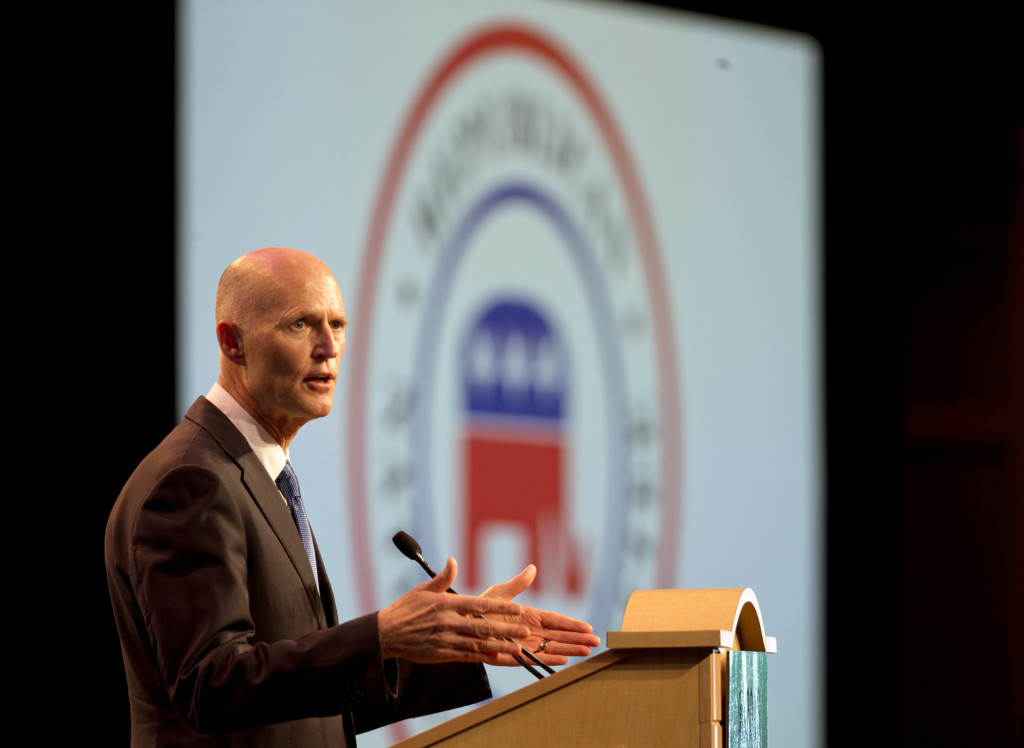
They thought it was impossible. Some still fear it. Others can barely believe it. But leading Republicans are beginning to accept the idea that Donald Trump will be their party’s presidential nominee. In the wake of the businessman’s commanding wins in five Eastern states this week, a growing number of national Republicans and GOP lawmakers on Capitol Hill say Trump has taken on an indisputable air of inevitability. Some argue they should get behind him now and abandon the “Never Trump” efforts still nursed by some establishment Republicans. Embracing Trump, these Republicans say, may be the GOP’s only hope of blocking Democrat Hillary Clinton in November. “Donald Trump is going to be our nominee,” Florida Gov. Rick Scott wrote on Facebook this week. “The Republican leaders in Washington did not choose him, but the Republican voters across America did choose him. The voters have spoken.” “Republicans now need to come together,” Scott wrote, warning that continued opposition to Trump “will be nothing more than a contribution to the Clinton campaign.” On Capitol Hill, support for Trump has also gotten markedly easier to find. “I don’t understand. I mean, it’s not ‘Never Trump.’ It’s ‘Never Hillary.’ Never, never, never Hillary. Come on. Wake up and smell the coffee,” said Rep. Mike Kelly of Pennsylvania, who earlier this week cast his ballot for Trump, along with all members of his large family and 57 percent of Republican primary voters in his state. “I’ve never seen a party attack one of its own candidates with this aggressiveness,” Kelly said of GOP establishment figures who oppose Trump, blaming it on an elitist Washington attitude out of touch with voters. Sen. Orrin Hatch of Utah, a respected senior member of the Senate, previously endorsed Jeb Bush and then Sen. Marco Rubio and said he doesn’t intend to endorse Trump. But Hatch said of Trump, “It looks to me like he’s going to win, and if he does, I’m going to do everything in my power to help him.” Some leading Republicans have forecast that a Trump candidacy could spell electoral disaster, help Democrats win back control of the Senate and even cost safe Republican seats in the House. They point to Trump’s disparaging comments about women and minorities that have contributed to high unfavorability ratings. Hatch, along with others, disagreed. “I think he could be great if he’ll get serious about being president, and I think he will,” Hatch said. “When he gets hit with reality that this is the toughest job in the world, he’s a clever, smart guy who I think will want to be remembered for doing good things, so I have a feeling he can make that transition.” On Thursday, Trump picked up endorsements from two House committee chairmen: Reps. Bill Shuster of Pennsylvania, who chairs the Transportation Committee, and Jeff Miller of Florida, who chairs Veterans Affairs. He talked foreign policy in a phone call with Sen. Bob Corker, R-Tenn., who heads the Foreign Relations Committee. Corker later was full of compliments about Trump, though he said he had no plans to endorse him. To be sure, not all are on board. Some in the GOP continue to cringe at the thought of vulnerable Senate Republicans and candidates getting linked to Trump’s provocative stances or attempting to distance themselves from them. “My feeling about Donald Trump is, I don’t think that that’s our best foot forward at all,” said Sen. Jeff Flake of Arizona, an outspoken Trump critic. “And I can’t imagine being forced to take some of those positions that he’s taken. A ban on Muslims, build a wall and make the Mexicans pay for it, you name it.” It remains uncertain whether Trump will amass the 1,237 delegates needed to clinch the nomination ahead of the Republican convention in Cleveland in July. If he does not, Texas Sen. Ted Cruz hopes to make a play to win the nomination as balloting progresses. Ohio Gov. John Kasich also remains in the race. Next week’s primary in Indiana, where polling suggests a close race, could be crucial in determining whether either Cruz or Kasich can continue to argue they have a path forward. Roger Villere, longtime Louisiana state GOP chief and one of the national party’s vice-chairmen, said a “clear supermajority” at the Republican National Committee spring meeting earlier this month in South Florida were warming to the idea of Trump as standard-bearer. “There were a lot of them who Trump wasn’t their first choice, but when we got in closed rooms and everybody started talking, the general consensus was that he’s going to be our nominee, and we will rally around him,” Villere said Friday. “I wouldn’t say it was even reluctance. It’s just the reality.” Offering a common party refrain, Villere added, “All of our possibilities are clearly superior to what the Democrats have.” Republished with permission of the Associated Press.
Congressional GOP beginning to accept Donald Trump as nominee
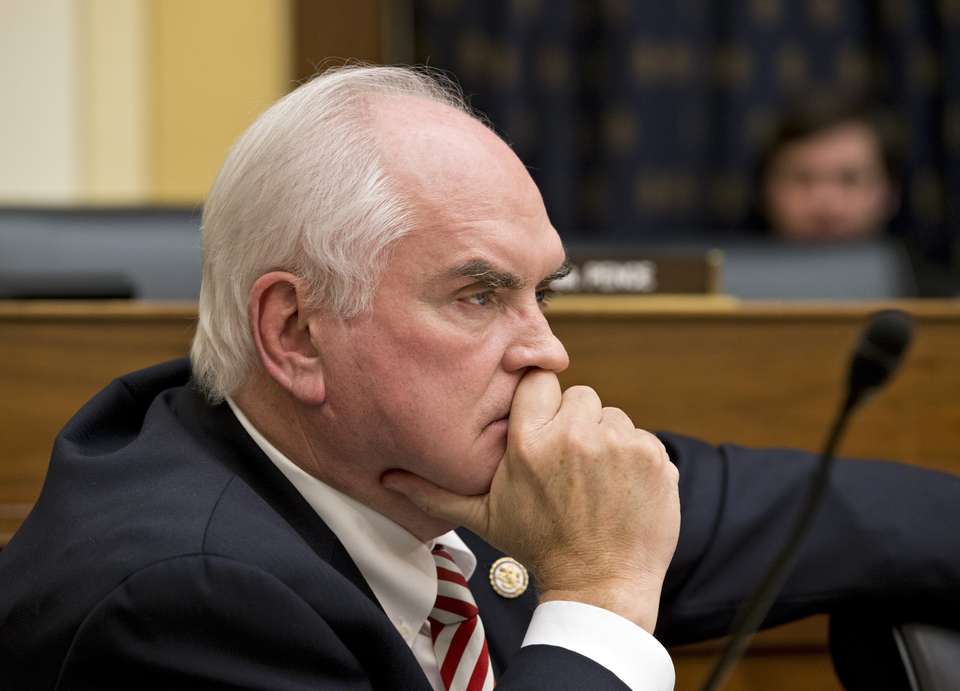
Congressional Republicans are beginning to accept, and even embrace, an outcome that was once unthinkable: Donald Trump as the GOP presidential nominee. In the wake of the businessman’s commanding wins in five Eastern states this week, a growing number of lawmakers say that Trump is taking on an air of inevitability. Some argue they should get behind him now instead of trying to stand in his way, as some establishment Republicans are still attempting to do by backing various “Never Trump” efforts. For some lawmakers, supporting Trump is seen as their only hope of stopping the Democrats’ likely candidate, Hillary Clinton, in November and ensuring a Democratic president doesn’t fill Supreme Court vacancies. “I don’t understand. I mean, it’s not ‘Never Trump.’ It’s ‘Never Hillary.’ Never, never, never, Hillary. Come on. Wake up and smell the coffee,” said Rep. Mike Kelly of Pennsylvania, who earlier this week cast his ballot for Trump, along with all members of his large family and 57 percent of Republican primary voters in his state. “I’ve never seen a party attack one of its own candidates with this aggressiveness,” Kelly said of GOP establishment figures who oppose Trump, blaming it on an elitist Washington attitude out of touch with voters. Sen. Orrin Hatch of Utah, a respected senior member of the Senate, previously endorsed Jeb Bush and then Sen. Marco Rubio and said he doesn’t intend to endorse Trump. But Hatch said Thursday of Trump: “It looks to me like he’s going to win and if he does I’m going to do everything in my power to help him.” Some leading Republicans have forecast that a Trump candidacy could spell electoral disaster, help Democrats win back control of the Senate and even cost Republicans seats in the House. They point to Trump’s disparaging comments about women and minorities that have contributed to high unfavorability ratings. Hatch, along with others, disagreed. “I think he could be great if he’ll get serious about being president, and I think he will,” Hatch said. “When he gets hit with reality that this is the toughest job in the world, he’s a clever, smart guy who I think will want to be remembered for doing good things, so I have a feeling he can make that transition.” To be sure, not all are on board, and some lawmakers cringe at the thought of vulnerable Senate Republicans and candidates getting linked to Trump’s controversial stances or attempting to distance themselves from them. “He’s looking more inevitable, yeah. I’ve been wrong all along,” said GOP Sen. Jeff Flake of Arizona, an outspoken Trump critic. “My feeling about Donald Trump is, I don’t think that that’s our best foot forward at all. And I can’t imagine being forced to take some of those positions that he’s taken. A ban on Muslims, build a wall and make the Mexicans pay for it, you name it.” It remains uncertain whether Trump will amass the 1,237 delegates needed to clinch the nomination ahead of the Republican convention in Cleveland in July. If he does not, Texas Sen. Ted Cruz hopes to make a play to win the nomination as balloting progresses. Ohio Gov. John Kasich also remains in the race. On Capitol Hill, Cruz remains an unpopular figure, having disparaged party leaders and led the charge to force a 16-day partial government shutdown in 2013 in a futile attempt to cut off money for President Barack Obama‘s health care law. Former House Speaker John Boehner, who resigned last fall under conservative pressure, lashed out at Cruz in comments published Thursday in Stanford University’s student newspaper, calling him “Lucifer in the flesh” and saying: “I get along with almost everyone, but I have never worked with a more miserable son of a bitch in my life.” Perhaps partly because of Cruz’s unpopularity, it’s getting easier to find leading lawmakers speaking publicly in favor of Trump. On Thursday, Trump picked up endorsements from House committee chairmen: Bill Shuster of Pennsylvania, who chairs the Transportation Committee, and Jeff Miller of Florida, who chairs Veterans Affairs. Sen. Bob Corker, R-Tenn., who heads the Foreign Relations Committee, spoke on the phone with Trump on Thursday and later told reporters they had a good and substantive conversation, though he has no plans to endorse him. On Trump’s foreign policy speech, Corker said: “Let’s face it, the foreign policy establishment in Washington hasn’t been exactly brilliant in their assessments of things, and I do like the fact that he’s challenging that status quo, I really do. … I think his campaign, like anybody who hadn’t been in the public arena before, is evolving.” Rep. Tom Rooney of Florida was a leading Rubio backer, but said now “it’s time to move on.” “The people have spoken. The Republican primary electorate has spoken so he deserves the opportunity to be our nominee,” Rooney said. “If he screws it up as the nominee and hurts the down-ballot ticket, then he screws it up. But right now the people want him to be the nominee.” Republished with permission of the Associated Press.


